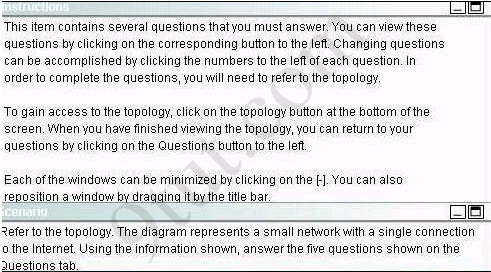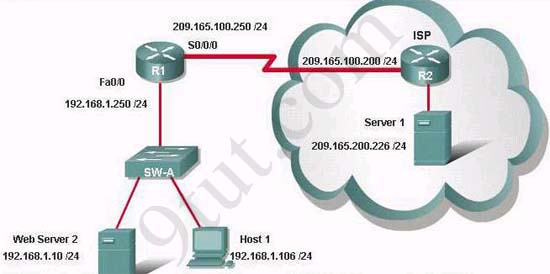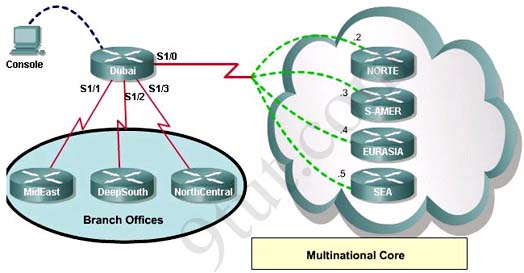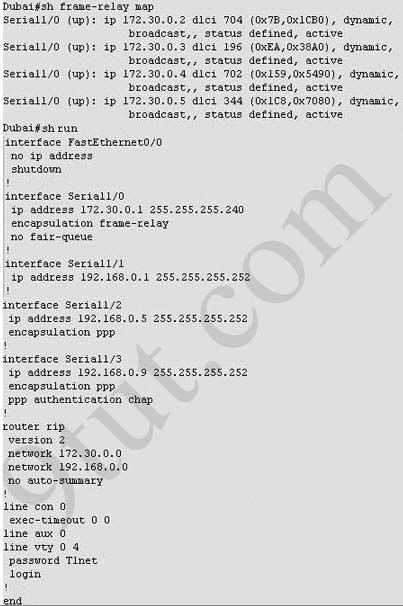CCNA – Hotspot
Here you will find answers to CCNA hotspot Questions
Hotspot Routing Question


Question 1:
If the router R1 has a packet with a destination address 192.168.1.255, what describes the operation of the network?
A – R1 will forward the packet out all interfaces
B – R1 will drop this packet because it is not a valid IP address
C – As R1 forwards the frame containing this packet, Sw-A will add 192.168.1.255 to its MAC table
D – R1 will encapsulate the packet in a frame with a destination MAC address of FF-FF-FF-FF-FF-FF
E – As R1 forwards the frame containing this packet, Sw-A will forward it ti the device assigned the IP address of 192.168.1.255
Answer: B
Question 2:
Users on the 192.168.1.0/24 network must access files located on the Server 1. What route could be configured on router R1 for file requests to reach the server?
A – ip route 0.0.0.0 0.0.0.0 s0/0/0
B – ip route 0.0.0.0 0.0.0.0 209.165.200.226
C – ip route 209.165.200.0 255.255.255.0 192.168.1.250
D – ip route 192.168.1.0 255.255.255.0 209.165.100.250
Answer: A
Quetion 3:
When a packet is sent from Host 1 to Server 1, in how many different frames will the packet be encapsulated as it is sent across the internetwork?
A – 0
B – 1
C – 2
D – 3
E – 4
Answer: C or D(depending on your understand, please read the comments to understand why)
Question 4:
What must be configured on the network in order for users on the Internet to view web pages located on Web Server 2?
A – On router R2,configure a default static route to the 192.168.1.0 network
B – On router r2, configure DNS to resolve the URL assigned to Web Server 2 to the 192.168.1.10 address
C – On router R1, configure NAT to translate an address on the 209.165.100.0/24 network to 192.168.1.10
D – On router R1, configure DHCP to assign a registered IP address on the 209.165.100.0/24 network to Web Server 2
Answer: C
Question 5:
The router address 192.168.1.250 is the default gateway for both the Web Server 2 and Host 1. What is the correct subnet mask for this network?
A – 255.255.255.0
B – 255.255.255.192
C – 255.255.255.250
D – 255.255.255.252
Answer: A
Hotspot Frame-relay Question


(In the old days, this question was a multi-choice question but Cisco upgraded it into a lab-sim question. Therefore, instead of listing all the configuration as above, you have to type show frame-relay map and show running-config to get its configuration)
Note: If you are not sure about Frame-Relay, please read my Frame Relay tutorial.
Question 1:
What destination Layer 2 address will be used in the frame header containing a packet for host 172.30.0.4?
A – 704
B – 196
C – 702
D – 344
Answer: C
Question 2:
A static map to the S-AMER location is required. Which command should be used to create this map?
A – frame-relay map ip 172.30.0.3 704 broadcast
B – frame-relay map ip 172.30.0.3 196 broadcast
C – frame-relay map ip 172.30.0.3 702 broadcast
D – frame-relay map ip 172.30.0.3 344 broadcast
Answer: B
Question 3:
Which connection uses the default encapsulation for serial interfaces on Cisco routers?
A – The serial connection to the MidEast branch office
B – The serial connection to the DeepSouth branch office
C – The serial connection to the NorthCentral branch office
D – The serial connection to the Multinational Core
Answer: A
Question 4:
If required, what password should be configured on the router in the MidEast branch office to allow a connection to be established with the Dubai router?
A – No password is required
B – Enable
C – Scr
D – Telnet
E – Console
Answer: A or D (because maybe there are 2 versions of this question, depending on the output of “show running-config” command, please read the explanation below)
Explanation
This question is not clear for a long time but now maybe the trick was solved. What Cisco wants to ask is the word used as password, not the type of connection, so in the exam you might see some strange words for answers like “En8ble”, “T1net”, “C0nsole”. All you have to do is to use the command “show running-config” as wx4 mentioned below to find the answer.
wx4 commented:
Q4: if password required which?
in my example it was connection to North!
How to figure out which pw is required?
#show running-config
1. check the interface to the router you need connection to. If there is “ppp authentication” you need a password!
2. you will find the password on the top of your running-config output
check the area:
username North password c0nsole
username xxxxx yyyyy
username…
in my case it was c0nsole, in your case it can be no password needed or a different password.
If you are still not clear, please read anton‘s comment:
A big question I noticed here was about the FR Lab regarding the password. You have to perform a show running-config and look for USERNAME and PASSWORD.
i.e.
username South_Router password c0nsol3
username North_Router password t31net
Obviously this has to be en PPP encapsulation, if asked for a posible password for SOUTH_ROUTER you pick c0nsol3, and for NORTH_ROUTER you pick t31net. If you’re running HDLC, i would pick “no password is required”.



Hi Cleo
Sorry to say your explanation is completely irreverent.
had all four question on my ICND2 Exam on saturday.. word for word.. on this one..
For the output shown in Q4 of this example, the link between MidEast and Dubai (Dubai Se 1/1) uses HDLC, and therefore uses NO authentication and requires NO password. The answer is A.
Hi I am sitting for my CCNA exam in one month and would request for the latest dumps, if you have kindly send them to me on jgateru@gmail.com
i got one asking i think where would the ip for 172.30.4.4 be i think the question was asking for the DLCI it was a new question im not sure what the answer was. does anyone else remember the rest of the questions were the same.
Question 3:
When a packet is sent from Host1 to Server1,in how many different frames will the packet be encapsulated as it is sent across the internetwork?
Answer:
3
Explanation:
First: Host1 encapsulates the packet into frames and forwards to the switch.
Switch in turn forwards the same frame to router R1.
Second: Router R1 receives the frame on one interface and it is encapsulates into new packet once it leaves the router R1 towards the direction of server1.
Third: R2 receives this packet and it also encapsulates the frame into new packet when it is forwarded to server1 on different interface of R2.
Therefore the packet is sent using three different frames to reach from Host1 to server1
sorry but on the exam i must do this configuration or router example (question 2) or it will be like this? picture end answers?
does any have one of these question in exam??
I think that this is a riddle.
“…how many different frames wil the packet be encapsulated as it is sent across the internetwork”
It will be encapsulated as ethernet frame between the host and the switch, between the switch and R1, and from R2 to the server. Thus, between R1 and R2 it will be encapsulated in another frame.
So, Two different frames.
Hello Guys I hope you will be fine there. I have CCNA (640-802) and CCNA security (640-554) Vouchers on special discount of 58% for World wide, with six months expiry date till you purchase. Each voucher cost 70USD.
Details Required For CCNA Voucher For Discount Processing:
1-Full Name. 1st Name & Last Name (as you want to appear on certificate & documents)
2-Country.
3-City.
4-State.
5-Pin Code (or Area Code)
6-Residential Address (or where you can collect your Certificate or further correspondence
can be received)
7-Date of birth
Add me on Skype through this information which is written below:
Skype Name: rockon660
you can also email me at this email address which is written below:
madeelqaiser@gmail.com
If you have any Questions feel free to contact me.
Thanks,
Best regards,
Adeel
@Theles, regarding your comment about Question 3 of the hotspot routing..
Your assumption of the answer being two might be correct if the question was “how many different frame *types* wil the packet be encapsulated as it is sent across the internetwork?”..
Then there can be two different frame types. One being the “Ethernet” frame type for the LAN and some other frame-type such as PPP for the point-to-point. But the question asks how many different frames.
So the answer should be 3 as far as I know. remember the Ethernet frame the packet gets when it’s at R1 LAN is completely different from the ethernet frame it gets when its at R2 LAN.
Source Mac Destination Mac
Host 1 Router 1 LAN
(1st change)
Router 1 WAN Router 2 WAN
(2nd change)
Router 2 LAN Server
So I think the answer is 2
Passed exam today , this question and many other questions in this web site, were in exam . Thanks for sharing and teaching !
@Charliez,
Source Mac Destination Mac
Host 1 Router 1 LAN => Yes, this would be the 1st Frame (Ethernet_
(1st change)
Router 1 WAN Router 2 WAN => This is the 2nd Frame (PPP or HDLC)
(2nd change)
Router 2 LAN Server ==> ?? Why haven’t you counted the frame here? R2 needs to encapsulate the IP packet in another frame with source MAC of R2′s LAN interface and the destination MAC of the Server NIC. So this is Frame number 3!
So the answer is 3
Frame relay question on the exam.
Passed 31/08 this frame relay SIM was on there
@Cleo
So what do you thing about this question nr 1? By default router should drop the packet however it is valid ip address so which one is correct than????
Frame-relay sim will be the exam or not please help me
@Lukas
The directed broadcast address IS a valid IP address (not a valid HOST address, but a valid IP address). It is used in different situations (e.g. DHCP relay). Thus, answer B is wrong.
The correct answer is “D”. The directed broadcast work by encapsulating the packet Layer2 broadcast frame (destination MAC FFFFFFFF), which will contain the frame within the broadcast domain. This is exactly answer D.
@Cleo
Thats what i thought. However in my opinion this question is not completely valid, as routers by default are dropping direct broadcasts and there is nothing said that this option is enabled. Would you agree?
@Lukas
Exactly! Thus, if answer B was the right answer, it should have stated:
“R1 will drop this packet because it is configured to drop directed boradcast packets”.
Since the reason provided is not valid, the response is wrong. And then the only viable answer remains D
@Cleo
COOOL! Thanks a lot if i get this question i will mark D as an answer :D
Most OS’s will not let you assign a broadcast address as the host address and if you manage to do so they will drop frames as ARP breaks. The answer “Sw-A will forward it to the device assigned the IP address of 192.168.1.255″ is therefore wrong as it states “device assigned the IP address of 192.168.1.255″ which typically you cannot do.
Passed 640-816 today 944/1000. This question was there
@ roggy98
Which question?
Thanks 9tut. I made it. I passed my CCNA 200-120 today. The sim is Access-list 1 , Access-list 2 & EIGRP. A lot of new questions like Netflow, Syslog, SNMP, VRRP, and GLBP.
I am going to sit my 640-802 CCNA exam on 2oth Sep. I want to have frame-relay Lab. Please help me. Please send me the latest Lab to bishop766@gmail.com
Thank you
anybody took 802 recently PLEASE contact me qmailer yahoo
Can anyone please give me the latest dumps for 640-802, it would be greatly appreciated.
amirakclubs@gmail.com
thanks
Hotspot Routing Question 1
RE: 192.168.1.255
https://learningnetwork.cisco.com/thread/54220
Hotspot Routing Question 3
RE:”…how many different frames will the packet be encapsulated as…”
https://learningnetwork.cisco.com/thread/13618
Hotspot Routing Question 3
…How many different frames? Three.
How many different encapsulation types? Two.
Answer is: D
Today I did the certification exam … pass 946 score
but the sim frame-relay had problems.
not had the configuration frame-relay and did not accept the command show frame-relay map
Hi All….
Question no # 4. (FR)
What is the correct answer? Please help coz I’m totally confuse with the explanation given.
Thanks
Cheers :-)
@Abs619
This is not a frame relay question but rather a ppp authentication question. Recall that ppp authentication uses pap and chap. If a password exists it will be listed in the running config under the hostname line. This will have a username (name of the router) and a password that that matches for each router.
Q4 references router (MidEast), the “run config” shows that interface s1/1 does not use “encapsulation ppp” & “ppp encapsulation chap” or pap, thus no need for a password. If no encapsulation is listed under an interface than Cisco default encapsulation is assumed (HDLC).
Here are some examples of ppp authentication for PAP and CHAP:
PAP example between R1 & R3
run config on R1:
hostname R1
username R3 password C0nsole
!
int serial 0/0
ip address 128.0.1.1 255.255.255.0
encapsulation ppp
ppp authentication PAP
ppp pap sent-username R1 password C0nsole
run config on R3:
hostname R3
username R1 password C0nsole
!
int serial 0/0
ip address 128.0.1.2 255.255.255.0
encapsulation ppp
ppp authentication PAP
ppp pap sent-username R3 password C0nsole
CHAP example between R1 & R3:
run config on R1:
hostname R1
username R3 password C0nsole
!
int serial 0/0
ip address 128.0.1.1 255.255.255.0
encapsulation ppp
ppp authentication CHAP
run config on R3:
hostname R3
username R1 password C0nsole
!
int serial 0/0
ip address 128.0.1.2 255.255.255.0
encapsulation ppp
ppp authentication CHAP
**note
encapsulation ppp by itself does not need a password, it has to be accompanied by the “ppp authentication” command.
Bottom line – if question 4 asks for some router, look at the router and find the interface in the run config, if it has ppp authentication chap or pap, look at the top of the run config for the password.
@x25_rc ==> This Dude has the most righteous answer to Q4!
Instead of all of you WHINERS worrying if you have studied the exact right dumps to memorize the exact right answers that you expect to find on your exact version of the exam on the exact day you take it, you should try, like this Dude, to understand the Internetworking concepts that the 9tut practice exam material is showing you.
There is no “magic” or “trick” to this question for those who understand the material.
The question is about passwords. If the link in question uses HDLC, the answer is none, since HDLC doesn’t use authentication. If the link in question uses PPP, the answer may also be none, as PPP does not REQUIRE the use of authentication, but authentication MAY be configured, if desired.
One of the links above (NorthCentral, Se1/3) is configured PPP with CHAP authentication. If your version of the exam asks you to identify a password that would be required to establish a connection between NorthCentral and a router in another Branch, you who understand the material know that CHAP expects to find the HOSTNAME of the router in the other Branch configured in a “Username HOSTNAME password SHAREDPW” global command in the Running-Config of NorthCentral. Conversely, the router HOSTNAME has a “Username NorthCentral password SHAREDPW” global command configured. The answer, in that case, is “SHAREDPW”.
So, all you whiners STOP OBSESSING about having memorized all the correct answers or not, you are making me SICK. Instead, LEARN THE MATERIAL, and use 9tut to polish up on practicing exam execution, how to take an exam.
@Any Mouse = Weiner
Hi im from mexico city..yesterday
Passed exam…tanks 9tut
Saludos desde mexico
Good explanation , i appreciate your support
Good morning at all,
this week end I have to sit for the 640-802; can anyone please give me the latest dumps?
camillo_@libero.it
I would thank you in advance.
On the question 3, the correct answers is D (3 frames).
Frames are the PDUs of the DataLink layer, wich service the cominucation on LOCAL networks. The packet (layer 3′s PDU) has to be encapsulated 3 times to get to server 1, for it has to go through 3 diferent networks.
If you dint get it that way, try to look at it this way.
First encapsulation happens to send the packet from host 1 to router 1. This is posible because of the comunication ocurring on the datalink layer, with the mac addresses of Host 1 and Router1.
After this, router 1 recieve the frame, and internally sends it to the network layer, process it, and sends it to the right interface. That’s when…
Second encapsulation happens!!! To send the packets from R1 to R2, the packets need to be encapsulated with the mac addresses of R1 and R2. router 2 recieve the frame, and internally sends it to the network layer, process it, and sends it to the right interface.
The third encapsulation occurs here, to send the packets from R2 to SRV1, with the mac addresses of each devices’ interfces.
Good answers to a not too good questions. CISCO tests really suck. Some questions are fine and sure test your knowledge of material and practical knowledge but majority are divided into categories of ‘gocha!’, playing on ambiguous semantics (like ‘blocking’ vs ‘discarding’ in stp and rstp which essentially are the same function) meaningless memorization of useless facts which will be forgotten two days after test and never used and simply incorrectly and vaguely stated questions, like question 1 in hotspot routing section. Most do understand how that part work but still need to argue what possibly maybe a right answer to it. ??? And strictly speaking there is not one. ‘B’ is not correct since broadcast is a valid address and its a favorite cisco way to get you, hoping you wont notice a semantic trick (for a router broadcast is ‘kind of ‘ invalid to accept but still the address is valid). Answer ‘D’ cant be right either – router will not encapsulate (or even decapsulate corresponding frame) the broadcast packet, it will ignore it. The rest of answers obviously are way off. To add to the fun – the question says ‘the router has the packet..’ Meaning exactly what?? That it receives it or that it actually has it, that is accepted it and is going to do something about it. If it ‘has’ it then it is possible that router was configured to accept broadcasts (like with dhcp helper or directed-broadcast commands). Then ‘B’ is wrong and the “D” seems like a better answer. If ‘has’ means the router just received the packet (or frame?) then it still can discard it and ‘frankly’ the ‘B’ then looks better (as ‘invalid address’ may mean from the router point of view). So either you assume there might be some additional configuration we know nothing about or assume that definition of ‘invalid’ include the packet been discarded . Your pick. Considering there are more questions like that on the test its no wonder that ability to pass the test is based mostly on either luck or having good dumps or both. True understanding of material has less to do with it than some may think.
This Frame Relay question was in my exam… thank you very much for you great help… God bless you…
@Marco
I think why the answer of the Q3 might be D is because its asking of “in how many different frames will the packet be encapsulated as it is sent across the internetwork?”, I think here’s the tricky question “as it is sent across the internetwork” not to include the Host.
I hope I\m right as I will be sitting tomorrow for my exam and I’ll answer D to this question if I run into it.
I pray to GOD to pass it as I’ve studied long.
Had Frame-Relay HS today and the IP’s seemed the same except they wanted to know the DCLI for 172.30.4.0? there was also password info there as well. Ran out of time after being thrown off by the IP not being in the same subnet almost like they were looking for a default gateway to one of the 4 locations in the multi-national core. Failed because I ran out of time on this 790.
Study this whole page. It was on today’s exam.
@Thyreme;
Many thanks, dear ;)
X25
Thanks a lot buddy .. :-)
Cheers :-)
http://www.earthframe.com/
pasukan polis dipilih bukan sebab pencapaian. If I do run it it will most likely be my last marathon. travel size,?
Hi Thyreme, thanks for the info. Did you get any other sims, like VTP?